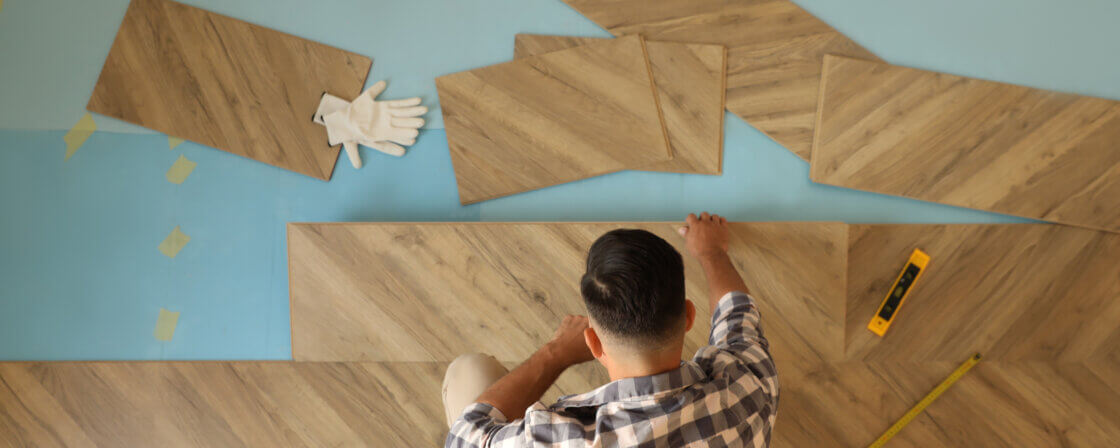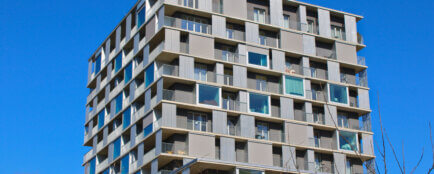Routine maintenance, minor repairs and adjustments in the rented apartment
High property prices and unfavourable mortgage interest rates are driving more and more people into renting. Many people have lived in a rented apartment for decades and want it to match their tastes and needs. That is why many of them rush to renovate their apartment. However, these modifications are very limited. After all, the apartment is still owned by its owner, even if they don’t live there. So think carefully before installing a shark aquarium or Louis XIV-style stucco.
Alterations in a rented apartment
One of the basic rules of renting is that the tenant must return the apartment to the landlord in its original condition. So what does this mean? If you have been given an apartment with a fitted kitchen and a fitted bathroom, you must return it as such. No equipment should be missing or missing, unless you have agreed with the landlord beforehand. Similarly, if the flat has been painted white and carpets have been laid, this must be the case when you hand it over.
Are you solving a similar problem?
Are you about to enter into a lease agreement?
We will draft or review a lease agreement tailored to your case. Thanks to our services, even after the end of the lease, no disputes will arise between landlord and tenant regarding unclear rights or obligations.
I want to help
- When you order, you know what you will get and how much it will cost.
- We handle everything online or in person at one of our 6 offices.
- We handle 8 out of 10 requests within 2 working days.
- We have specialists for every field of law.
However,the Civil Code also determines what a tenant can change in the apartment. This includes repairs and minor maintenance of the apartment, alterations to the apartment to prevent damage and temporary alterations to the apartment, e.g. furnishing the apartment and hammering in nails for hanging pictures. However, any temporary alterations must then be restored to their original state – the flat must be cleared, nail holes must be filled in, etc. Anything that the tenant and the landlord have stipulated in the lease agreement is also permitted. Alternatively, you can get the landlord’s permission for alterations to the flat afterwards, preferably by entering into a written agreement again.
So how does it work in practice? Mr Kocián rented an apartment from Mrs Veselá. In the lease agreement, they stipulated that Mr Kocián would equip the apartment with a new kitchen at Mrs Veselá’s expense. He did so after moving in and also drilled holes for hanging shelves. After five years he decided to move out. He cleared out the flat, sealed up the shelf holes and left the new kitchen unit in place. In doing so, he complied with all his obligations.
Maintenance and minor repairs in the rented apartment
Minor repairs to the apartment are the responsibility of the tenant. Minor repairs include, for example, floor repairs, maintenance of appliances or bathroom fittings and repairs to switches, doorbells and sockets. In general, minor repairs include all repairs costing less than CZK 1 000.
More demanding and expensive repairs are then the responsibility of the landlord. The landlord is obliged to keep the apartment in a fit state for use. These repairs include, for example, faults relating to water pipes, gas pipes or the supply of heat and hot water. Similarly, the landlord has a duty to replace broken equipment that is listed as part of the furnishings of the apartment. This may most often be a cooker, washing machine or fridge.
Routine maintenance, minor repairs and adjustments in the cooperative apartment
Housing cooperatives are a relic of a bygone era, but also a returning trend. These flats are very different from privately owned flats, even in terms of minor repairs and alterations. In the case of a cooperative apartment, you are not the owner, but the housing cooperative. You then own a share in the housing association and have the right to rent it out. For this reason, you are considerably restricted in your disposal of the cooperative flat compared to a flat in private ownership.
Modifications in a cooperative apartment
If you are going to make major repairs to your condominium, you will need permission from the association. Such permission may be set out in the co-op’s bylaws or you may have to apply for it. In any case, you should inform the cooperative about the renovation. You should also take into account that in the case of alterations requiring planning permission, the co-operative will apply for planning permission instead of you, as it is the official owner of the flat.
Similarly, you will need permission from some housing associations for alterations that do not require planning permission, for example if you decide to replace a kitchen unit or lay a new floor. How to approach these alterations should be described in the co-op’s bylaws.
As with a rented flat, you will not need consent for minor repairs that involve, for example, simply repairing floors, replacing switches and sockets, etc.
Maintenance and minor repairs in a cooperative flat
Even though you are effectively a tenant in a cooperative flat, the same rules do not apply to minor repairs as in a rented flat. The NZO states that the scope of minor repairs and routine maintenance is determined by the cooperative in its statutes. For this reason, the rules may vary from cooperative to cooperative and it is not possible to say in general terms what kind of repairs and maintenance is your responsibility and what must be provided by the cooperative.
In practice, it may work, for example, that the co-op sets the scope of minor repairs and routine maintenance so that everything except the outside of the apartment and common areas and spaces is the responsibility of the co-op member. Thus, if a member of the cooperative, Mrs. Klímová, has a leaking heater, she must arrange the repair herself. However, if there is a defect in the common heating pipes, the repair is the responsibility of the cooperative, even if the defect affects only Mrs Klím.
In practice, we also dealt with the tricky situation of repairing the paving on the terrace. It belonged to our client’s apartment, but at the same time it actually formed the roof of a part of the house. The responsibility should therefore lie with the owners’ association, as discussed in the following chapter.
Routine maintenance, minor repairs and alterations in a privately owned apartment
If you have a freehold flat, this means that you are the beneficial owner. However, if you live in a building that has at least 5 units and at least three of them are owned by three different people, this means that you are also a member of the unit owners’ association. Even a unit owners’ association has bylaws, as well as an owners’ agreement and an owner’s declaration, which set out the rules of operation and usually rules for alterations and repairs.
Modifications in a privately owned apartment
Of the three options, you are the least restricted in a freehold flat. You can make large and small modifications, including building work, without needing permission from the unit owners’ association. However, you must report your intention to renovate to the HOA and in some cases the HOA will also ask you to provide construction documentation. In addition, you must also give the HOA access to the construction site. This is because the other residents of the apartment building have the right to check that the construction work does not interfere with their property (including their apartments) or common areas.
Tip for article
Do you want to buy an apartment? We will provide you with a complete contractual and legal service related to the purchase of real estate. We will handle it within 48 hours, flawlessly and professionally.
The express consent of the HOA is required if you would interfere with the common parts of the house. Their exact definition can be found in the owner’s declaration. However, this usually includes water and heat distribution systems, balconies or the sewerage system.
In the model case, Mrs Jelínková wants to modernise her kitchen but does not plan to interfere with the water supply. Therefore, she only has to notify the SVJ of her intention and allow them to control the renovation. At the same time, the HOA will ask her for the construction documentation. Once the documentation has been submitted, Ms Jelínková can start the reconstruction and does not have to deal with anything else.
Maintenance and minor repairs in a privately owned apartment
The responsibility for repairs and maintenance of the apartment lies with the owner. The repairs paid by the HOA are only those relating to the common parts of the building from the common repair fund to which all members contribute. The common parts are, as we have already mentioned, defined in the owner’s declaration.
Summary
The level of adaptations and responsibility for repairs varies according to the type of dwelling – different rules apply to a rented dwelling, different rules apply to a cooperative dwelling and different rules apply to a freehold dwelling.
In a rented flat, the tenant is only allowed to make minor alterations (e.g. hammering in nails), which must be restored to their original condition at the end of the tenancy. Minor repairs up to CZK 1,000 are paid for by the tenant, major faults (e.g. heating, water supply) are dealt with by the landlord. Major alterations are only possible with the landlord’s consent.
In a cooperative apartment you are not the owner, but a tenant with a share. Major alterations (kitchen replacement, renovation) require the consent of the cooperative. For minor repairs, the rules vary by statute – the co-op can determine what the member pays and what the co-op pays.
In a freehold flat, the owner has the greatest freedom. Renovations can be done without consent, but must be reported to the HOA and allowed to be inspected. Interventions in the common parts of the house (e.g. wiring, balconies) already require the consent of the HOA. The owner is responsible for all repairs inside the apartment, the HOA for the common areas.




